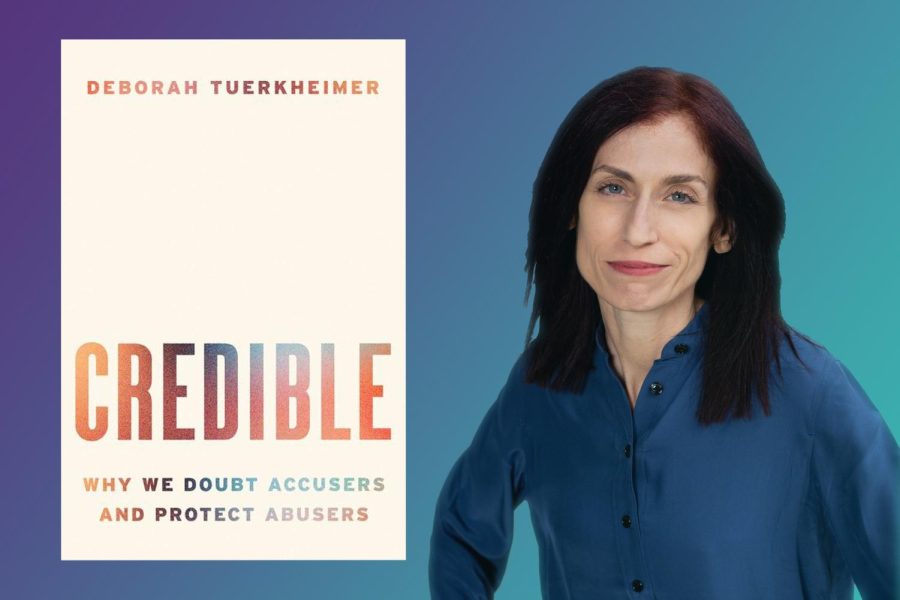Pritzker Prof. Deborah Tuerkheimer publishes “Credible: Why We Doubt Accusers and Protect Abusers”
Pritzker Prof. Deborah Tuerkheimer’s new book “Credible: Why We Doubt Accusers and Protect Abusers.”
February 28, 2022
Content Warning: This story contains mentions of sexual assault.
Pritzker Prof. Deborah Tuerkheimer recently published a book about the aftermath of sexual abuse and why survivors often decide not to report this abuse.
In “Credible: Why We Doubt Accusers and Protect Abusers,” Tuerkheimer analyzes the role credibility plays both in a court of law and in culture at large.
“I talk about what I call ‘credibility discounting,’ which is what often happens when victims of abuse, particularly marginalized victims, come forward with an allegation and the ways in which our culture and our law are primed to devalue the word of that person,” Tuerkheimer said.
Alternatively, what she calls “credibility inflation” is the trust given to powerful people in society. The combination of credibility discounting and credibility inflation creates what Tuerkheimer calls the “credibility complex,” which is society’s predisposition to distrust survivors and trust abusers, who are often powerful men.
She said the credibility complex is immensely harmful to survivors.
“It means that most of the time abuse allegations aren’t acted upon, and the status quo is preserved,” Tuerkheimer said.
Above all, “Credible” focuses on cultural change. It highlights the ways individuals often discount survivors’ stories and offers advice on how to change this norm.
Tuerkheimer emphasized the importance of reframing the way people respond to friends’ stories. She said these informal interactions can create a culture where survivors are not blamed or disregarded.
At Northwestern, the Center for Awareness, Response and Education serves as a confidential resource for survivors on campus. Director of CARE Carrie Wachter said she encourages students to respond to their friends’ stories with empathy.
“Those are the three main things: believe them, it’s not their fault and there’s resources for them,” Wachter said.
With the #MeToo movement bringing discussions about sexual assault to the forefront, Tuerkheimer said she was inspired to write this book from her experience working as a former prosecutor handling special victims cases. She said she realized that our society was hearing more stories of abuse but still didn’t know how to respond to them.
Tuerkheimer’s goal is to shift the conversation about sexual assault and harassment, creating a culture where people believe survivors. She spoke with many survivors to highlight their voices in her book. In these conversations, Tuerkheimer noticed a pattern in the impact of credibility on survivors.
“The aftermath of abuse is as bad as or even worse than the abuse itself because of the ways in which credibility discounting can be so devastating,” Tuerkheimer said.
Tuerkheimer’s book focuses on survivor’s accounts of the aftermath of their experiences.
Pritzker Prof. Kimberly Yuracko said the survivors’ stories make the book powerful.
“That’s what really makes the book resonate,” Yuracko said. “It’s account after account, and they’re all different but there’s this theme that runs through them of the pain that’s caused by women’s speech being devalued.”
Tuerkheimer said she strives to create change with her book. She said credibility discounting is embedded in criminal and civil law and suggested reforming these areas of law.
Pritzker Prof. Juliet Sorensen specializes in international criminal law and human rights and recently taught a class that covered rape as a weapon of war.
“I hope that not just local courts but also international tribunals will read ‘Credible’ and reflect on the lens through which they view victims who are testifying about the abuse and misconduct that they have experienced,” Sorensen said.
Tuerkheimer said the book is aimed at two audiences: survivors and everyone else who makes credibility judgments.
She said people want to be fair but often don’t realize the extent to which the credibility complex is embedded in society.
“I hope (the book) speaks to survivors and helps many to better understand their decision, either to come forward or not to come forward, and it really puts the burden on everyone else to do better,” Tuerkheimer said.
If you or someone you know needs support around sexual violence, Northwestern has survivor-centered resources available. CARE is a confidential resource for anyone who has experienced sexual violence, relationship violence or stalking (Instagram: @carenu). Students Promoting Education, Awareness and Knowledge (SPEAK) For Change is a student support and advocacy group operating under CARE (Instagram: @nuspeakforchange; Facebook: Speak For Change Northwestern). SHAPE (Sexual Health and Assault Peer Educators) is also a resource to connect folks to any resources they may need on their path to healing (Instagram: @nushape; Facebook: SHAPE Northwestern).
Email: [email protected]
Twitter: @ilanahutzler
Related Stories:
— Pritzker prof urges rape law reform at One Book One Northwestern event
— Northwestern professor discusses law reforms to support sexual assault survivors


